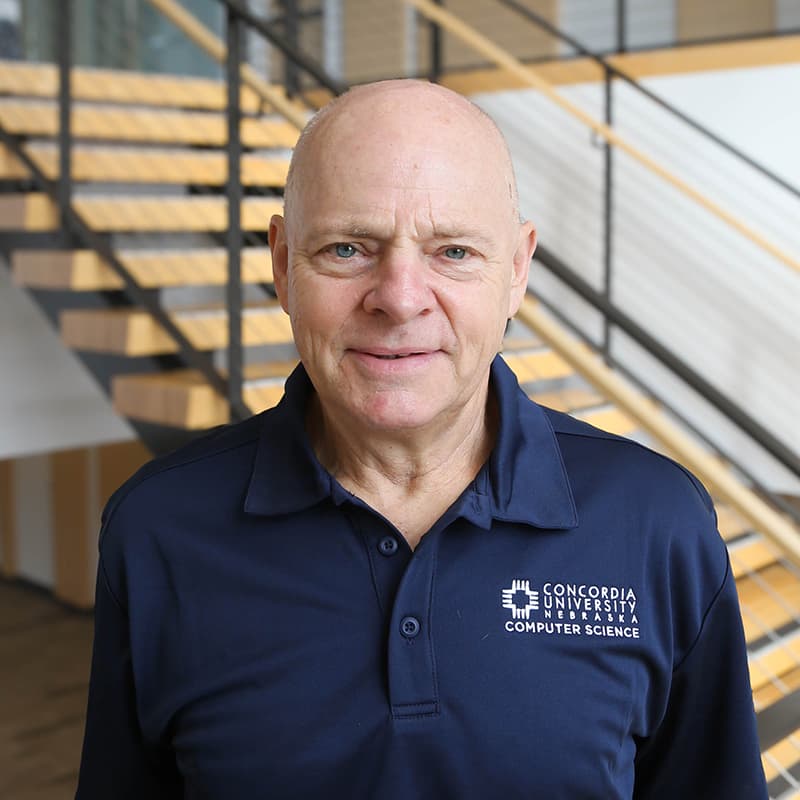
B.S. Physics
Major Minor
Physics Featured Courses
As a student in the physics major at Concordia Nebraska, you’ ll have the opportunity to take specialized courses related to various aspects of the physics profession. These classes, designed to equip you for leadership and service in various physics careers, are taught by some of our esteemed faculty who have extensive experience in their fields.
CHEM 116
General Chemistry II 3 credits
Lecture 3, Lab. 3. A continuation of general chemistry: chemical kinetics, equilibrium, acids and bases, oxidation-reduction chemistry, and fundamental qualitative analysis.
MATH 184
Calculus I 4 credits
A beginning course in the analysis of functions including analytic geometry. A study of limits, techniques and applications of differentiation, basic integration and transcendental functions.
PHYS 353
Thermodynamics 3 credits
See CHEM 353.
MATH 384
Differential Equations 3 credits
A study of ordinary differential equations, first and higher order, systems linear and non-linear, their solutions and applications, including La Place Transforms.
PHYS 399
Research in Physics 2 credits
Capstone course in physics. Students perform supervised independent research in physics, and also learn about issues related to the profession.
Application is open!
Physics Sample Schedule of Courses
The following sample course of study is an example of the sequence of courses you might take in order to receive your degree. Please plan to discuss your actual course of study with your advisor, who can help you stay on track to meet your academic and professional goals.
Semester 1
PHYS 111
General Physics I 4 cr.
CHEM 115
General Chemistry 4 cr.
FYE
First-Year Experience 1 cr.
GEN ED
General Education 9 cr.
18 Total Credits
Semester 2
PHYS 112
General Physics II 4 cr.
CHEM 116
General Chemistry II 3 cr.
GEN ED
General Education 10 cr.
17 Total Credits
Semester 3
PHYS 211
General Physics I Calculus Topics 1 cr.
PHYS 321
Introductory Mechanics 3 cr.
MATH 184
Calculus I 4 cr.
GEN ED
General Education 8 cr.
16 Total Credits
Semester 4
PHYS 212
General Physics II Calculus Topics 1 cr.
PHYS 353
Thermodynamics 3 cr.
CS 141
Computer Programming II 3 cr.
GEN ED
General Education 9 cr.
16 Total Credits
Semester 5
PHYS 354
Quantum Mechanics 3 cr.
PHYS 371
Electronics 3 cr.
MATH 186
Calculus II 4 cr.
MATH 322
Foundations of Statistics 3 cr.
GEN ED
General Education 3 cr.
16 Total Credits
Semester 6
PHYS 381
Modern Physics 3 cr.
PHYS 382
Advanced Physics Lab. I, II, III 1 cr.
MATH 284
Calculus III 4 cr.
GEN ED
General Education 8 cr.
16 Total Credits
Semester 7
PHYS 383
Introduction to Nuclear and Particle Physics 3 cr.
PHYS 390
Electricity and Magnetism 3 cr.
MATH 384
Differential Equations 3 cr.
GEN ED
General Education 6 cr.
15 Total Credits
Semester 8
PHYS 399
Research in Physics 2 cr.
CS 131
Computer Programming I 3 cr.
CHEM 231
Organic Chemistry I 4 cr.
GEN ED
General Education 6 cr.
15 Total Credits



Physics Faculty
As experts in physics, our faculty and instructors bring years of experience to the classroom.